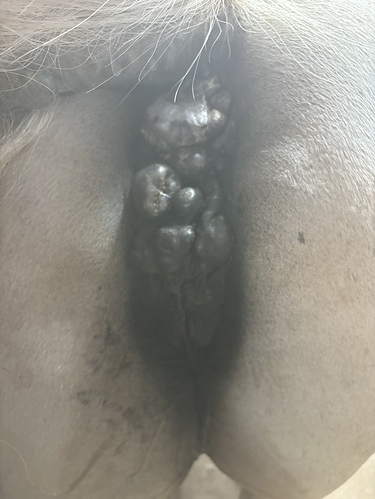All,
Posting to see if anyone has experiences with melanoma de-bulking for significant lesions and the pros/cons of a procedure.
I have a 21 year old Warmblood cross mare. When I purchased her in January, I noted that she had significant melanomas under her tail and in the perianal region. (She also has one on her muzzle and on her inner right hind, as well as what we presume is a melanoma (though it is covered) near her salivary gland.) The melanomas appear to have grown in the past 8 months, to the point where her rectum is now not visible.
She does not appear to be bothered or in pain from these tumors, and has no current issues defecating. (They obviously get messy with manure, but she is happy to have me wash them off. I have spent more time than I care to admit closely watching her poop, and there is no resistance as she passes manure.
I consulted with one local lameness vet (at the farm on a different call, so I just asked their opinion) who advised against surgery, saying that melanomas tend to grow back and these surgical sites do not heal well. They did mention Oncept or other autologous vaccines as a possibility, but did not recommend surgery. (Oncept would require transportation to Cornell, which is about 6 hour round trip; I do not have a truck/trailer yet, so would have to arrange shipping.)
My primary veterinarian consulted with a veterinarian at Cornell on my behalf, who recommended excision/debulking surgery due to the tumor size, followed by vaccination with Oncept (first choice) or Torigen (second choice.). (The pro of the Torigen is that she would not have to travel back and forth; after vaccine creation, my primary vet could administer the shots.)
The surgeon did say that the wounds would likely dehisce, and that I would likely be dealing with managing wound care at home as they closed by second intention over approximately 8-12 weeks, but felt that the surgery would help make her more comfortable and would hopefully enable her to live a longer life. The surgery would be done standing, with sedation and a local block and/or epidural. I should note that the surgeon at Cornell has not yet seen the mare in person, so much of this is assessment is based on review of photos; obviously, she would be evaluated at Cornell first prior to initiating any surgery.
Surgery plus vaccination is looking to cost me, at minimum, $7500. This cost is high (and, frankly, is higher than what I paid for the horse; I bought her to be a safe, sane, happy hacker type with good manners that I could retire at the farm I am currently building: she’s all that and more) but is not an impossible obstacle, and if the surgery were to make a big improvement in her quality of life, I would pursue it. This horse is a total pet, and will be retired at home to my farm to retire after her riding career (such as it is; we bop around 2’ fences and hack slowly on the trails  ) is over. I have no problem pursuing all medical options for oldsters, providing those options are in the horse’s best interest and are humane; comfort is the goal.
) is over. I have no problem pursuing all medical options for oldsters, providing those options are in the horse’s best interest and are humane; comfort is the goal.
My concerns (other than cost) are the pain associated with the procedure, length of recovery, and likelihood of surgical complications. Again, my priority is that the mare is comfortable and happy. I’ve always heard that (barring significant internal complications) “something else will kill them before the melanoma does,” and given her age, I’m hesitant to put her through a surgery that might not benefit her. At the same time, however, she is in otherwise excellent health–she does has coffin join arthritis but is well-managed with Equioxx and Noltrex–and happy, so I am anxious that the melanomas will continue to grow and “block” the rectum, resulting in an impaction emergency or otherwise terrible colic, etc., but don’t know if this is likely or not.
I guess I’m just looking to bounce this off of others who may have been in a similar situation and see the success/outcomes of a srugery/treatment plan such as this.
ETA: Also curious if anyone has done Torigen or Oncept instead of surgery, or prior to surgery? (Torigen I know only needs 4-7 grams of a tumor, so it is “technically” possible to do with a very small sample and not huge excision, though I don’t know if this done in practice or would be advisable; I have a call in to ask about this.)


 Before you make any decisions, I think it would be best to have your mare seen in person at Cornell. They’ll be much better able to give you an idea of outcome post-operatively once they’ve done their exam, and you can find out if there is any other testing they’d recommend to look for internal disease.
Before you make any decisions, I think it would be best to have your mare seen in person at Cornell. They’ll be much better able to give you an idea of outcome post-operatively once they’ve done their exam, and you can find out if there is any other testing they’d recommend to look for internal disease.
 We do have other clinics/hospitals closer to us than Cornell, but those equine clinics do not have boarded oncologists there–but perhaps we don’t need one? At any rate, thanks to this comment and
We do have other clinics/hospitals closer to us than Cornell, but those equine clinics do not have boarded oncologists there–but perhaps we don’t need one? At any rate, thanks to this comment and